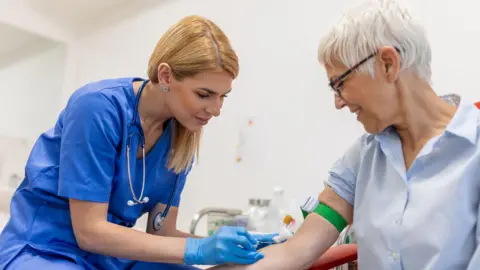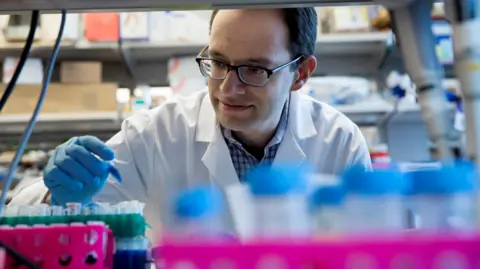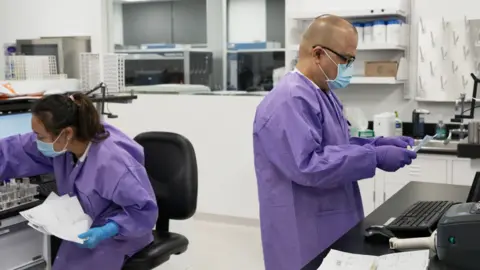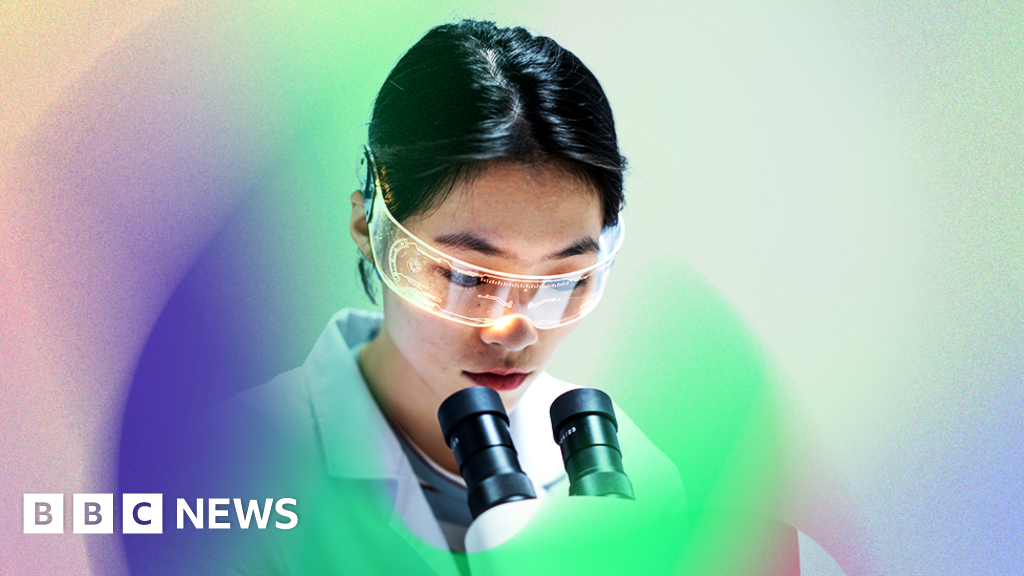 Getty Photos
Getty PhotosThat is the third characteristic in a six-part collection that’s how AI is altering medical analysis and coverings.
Ovarian most cancers is “uncommon, underfunded, and lethal”, says Audra Moran, head of the Ovarian Most cancers Analysis Alliance (Ocra), a worldwide charity based mostly in New York.
Like all cancers, the sooner it’s detected the higher.
Most ovarian most cancers begins within the fallopian tubes, so by the point it will get to the ovaries, it could have already unfold elsewhere too.
“5 years previous to ever having a symptom is once you may need to detect ovarian most cancers, to have an effect on mortality,” says Ms Moran.
However new blood assessments are rising that use the facility of synthetic intelligence (AI) to identify indicators of the most cancers in its very early levels.
And it is not simply most cancers, AI also can pace up different blood assessments for doubtlessly lethal infections like pneumonia.
 Memorial Sloan Kettering Most cancers Middle
Memorial Sloan Kettering Most cancers MiddleDr Daniel Heller is a biomedical engineer at Memorial Sloan Kettering Most cancers Middle in New York.
His group have been developed a testing expertise which makes use of nanotubes – tiny tubes of carbon that are round 50,000 instances smaller than the diameter of a human hair.
About 20 years in the past, scientists started discovering nanotubes that may emit fluorescent mild.
Up to now decade, researchers discovered change these nanotubes’ properties so that they reply to nearly something within the blood.
Now it’s attainable to place thousands and thousands of nanotubes right into a blood pattern and have them emit completely different wavelengths of sunshine based mostly on what sticks to them.
However that also left the query of deciphering the sign, which Dr Heller likens to discovering a match for a fingerprint.
On this case the fingerprint is a sample of molecules binding to sensors, with completely different sensitivities and binding strengths.
However the patterns are too refined for a human to pick.
“We will have a look at the info and we won’t make sense of it in any respect,” he says. “We will solely see the patterns which can be completely different with AI.”
Decoding the nanotube knowledge meant loading the info right into a machine-learning algorithm, and telling the algorithm which samples got here from sufferers with ovarian most cancers, and which from individuals with out it.
These included blood from individuals with different types of most cancers, or different gynaecological illness that could be confused with ovarian most cancers.

A giant problem in utilizing AI to develop blood assessments for ovarian most cancers analysis is that it’s comparatively uncommon, which limits the info for coaching algorithms.
And far of even that knowledge is siloed in hospitals that handled them, with minimal knowledge sharing for researchers.
Dr Heller describes coaching the algorithm on obtainable knowledge from just some 100 sufferers as a “Hail Mary move”.
However he says the AI was capable of get higher accuracy than the most effective most cancers biomarkers which can be obtainable immediately – and that was simply the primary attempt.
The system is present process additional research to see if it may be improved utilizing bigger units of sensors, and samples from many extra sufferers. Extra knowledge can enhance the algorithm, simply as algorithms for self-driving vehicles can enhance with extra testing on the road.
Dr Heller has excessive hopes for the tech.
“What we would love to do is triage all gynaecological illness – so when somebody is available in with a grievance, can we give medical doctors a instrument that shortly tells them it is extra prone to be a most cancers or not, or this most cancers than that.”
Dr Heller says this can be “three to 5 years” away.
 Karius
KariusIt isn’t simply early detection that AI is doubtlessly helpful for, additionally it is rushing up different blood assessments.
For a most cancers affected person, catching pneumonia will be lethal and, as there are round 600 completely different organisms that may trigger pneumonia, medical doctors need to conduct a number of assessments to establish the an infection.
However new forms of blood assessments are simplifying and rushing up the method.
Karuis, based mostly in California makes use of synthetic intelligence (AI) to assist establish the exact pneumonia pathogen in 24 hours, and choose the precise antibiotic for it.
“Earlier than our check, a affected person with pneumonia would have 15 to twenty completely different assessments to establish their an infection in simply of their first week in hospital – that is about $20,000 in testing,” says Karius chief government Alec Ford.
Karius has a database of microbial DNA which has tens of billions of knowledge factors. Check samples from sufferers will be in comparison with that database to establish the precise pathogen.
Mr Ford says that will have been unimaginable with out AI.
One problem is that researchers don’t essentially at present perceive all of the connections that an AI would possibly make between the check biomarkers and the ailments.
Over the past two years Dr Slavé Petrovski has developed an AI platform referred to as Milton that, utilizing biomarkers within the UK biobank knowledge to establish 120 ailments with a hit charge of over 90%.
Discovering patterns in such a mass of knowledge is barely one thing that AI can do.
“These are sometimes complicated patterns, the place there will not be one biomarker, however you must think about the entire sample,” says Dr Petrovski, whose is a researcher at prescribed drugs big AstraZeneca.
Dr Heller makes use of the same sample matching method in his work on ovarian most cancers.
“We all know that the sensor binds and responds to proteins and small molecules within the blood, however we do not know which of the proteins or molecules are particular to most cancers,” he says.
Extra broadly knowledge, or the shortage of it, continues to be a downside.
“Individuals aren’t sharing their knowledge, or there’s not a mechanism to do it,” says Ms Moran.
Ocra is funding a large-scale affected person registry, with digital medical information of sufferers who’ve allowed researchers to coach algorithms on their knowledge.
“It is early days – we’re nonetheless within the wild west of AI now,” says Ms Moran.



